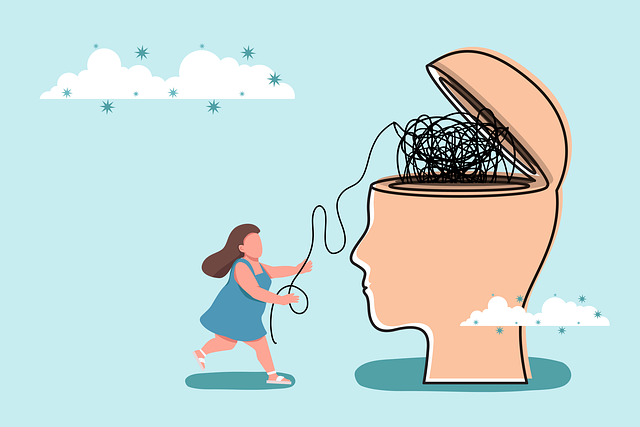Emotional Intelligence (EI) is vital for managing dissociative disorders like those treated in Lakewood Dissociative Disorder Therapy. High EI levels, cultural sensitivity, and integrating EI development into therapy enhance patient well-being. Self-awareness, mindfulness, empathy, and effective communication are key components of this approach, empowering individuals to process traumas, regain control, and improve social interactions. Effective communication techniques create safe spaces for expression, while cultural sensitivity ensures inclusive care. Public awareness campaigns further support these efforts, fostering a supportive environment for those seeking therapy.
Emotional intelligence (EI) is a powerful tool for navigating life’s challenges and fostering meaningful connections. Understanding EI and its profound impact on mental health is the first step towards personal growth. This article explores key aspects of building EI, including identifying emotional disorders like Lakewood Dissociative Disorder Therapy, cultivating self-awareness, enhancing empathy, and mastering effective communication. By delving into these strategies, individuals can revolutionize their interpersonal dynamics and overall well-being.
- Understanding Emotional Intelligence and Its Impact on Mental Health
- Identifying Emotional Disorders: A Case for Lakewood Dissociative Disorder Therapy
- The Role of Self-Awareness in Building Emotional Intelligence
- Enhancing Empathy: Developing a Deeper Connection with Others
- Strategies for Effective Communication to Foster Emotional Intelligence
Understanding Emotional Intelligence and Its Impact on Mental Health

Emotional intelligence (EI) refers to an individual’s ability to recognize, understand, and manage their own emotions, as well as empathize with others’ emotional states. It involves self-awareness, self-regulation, motivation, empathy, and social skills. Building EI is crucial for maintaining good mental health, as it helps individuals navigate complex interpersonal relationships and cope with stress effectively. For those dealing with conditions like dissociative disorder in Lakewood, enhancing emotional intelligence can significantly impact recovery and overall well-being.
Research highlights that high levels of EI can prevent burnout, a common issue among healthcare providers. Burnout Prevention Strategies for Healthcare Providers often emphasize the importance of self-care and cultivating emotional resilience. Cultural Sensitivity in Mental Healthcare Practice is another essential aspect, as it enables professionals to understand and respect diverse emotional expressions, fostering inclusive environments. By integrating EI development into therapy and mental health support, Lakewood Dissociative Disorder Therapy can offer more holistic care tailored to each individual’s unique needs.
Identifying Emotional Disorders: A Case for Lakewood Dissociative Disorder Therapy

Identifying emotional disorders is a critical step in fostering emotional well-being promotion techniques and trauma support services. One such complex condition that requires specialized attention is Lakewood Dissociative Disorder Therapy. This therapy focuses on individuals who experience episodes of dissociation, where they may feel detached from their thoughts, feelings, or surroundings. Such dissociative episodes can be triggered by traumatic events, leading to a disruption in one’s sense of identity and reality.
Lakewood Dissociative Disorder Therapy offers a unique approach to addressing these issues, providing a safe space for individuals to confront and process their traumatic experiences. By employing various techniques, therapists help clients regain a sense of control and integrate their disparate emotional states. This personalized therapy not only aids in the recovery process but also boosts confidence, empowering individuals to lead more fulfilling lives despite their past traumas.
The Role of Self-Awareness in Building Emotional Intelligence

Self-awareness is a cornerstone in building emotional intelligence and is especially crucial for individuals managing conditions like dissociative disorders. In the context of Lakewood dissociative disorder therapy, enhancing self-awareness involves deeply understanding one’s emotions, thoughts, and behaviors—a process that can be facilitated through various therapeutic techniques. This includes mindfulness practices, which encourage individuals to focus on the present moment, observe their feelings, and accept them without judgment.
By cultivating self-awareness, individuals can better recognize when they are experiencing distress or disconnection, enabling prompt risk management planning for mental health professionals. It empowers people to navigate their emotional landscapes more effectively, fostering improved mental wellness and potentially reducing anxiety relief needs as they gain a deeper sense of control over their inner experiences. This proactive approach is further enhanced through the exploration of one’s past traumas, triggers, and coping mechanisms in a safe therapeutic environment.
Enhancing Empathy: Developing a Deeper Connection with Others

Empathy is a cornerstone of emotional intelligence, fostering deeper connections and understanding between individuals. It involves recognizing and sharing the feelings of others, enabling us to build stronger relationships. For those dealing with dissociative disorders like Lakewood Dissociative Disorder Therapy, enhancing empathy can be transformative. By focusing on active listening, non-verbal cues, and genuine interest, individuals can navigate their experiences more effectively, leading to improved social interactions.
Developing empathy involves not just understanding another person’s emotions but also responding sensitively. Mental health professionals can play a crucial role in teaching communication strategies that promote empathy, especially through risk assessment and burnout prevention initiatives. These strategies help professionals maintain awareness of their clients’ emotional states, fostering an environment where empathy thrives. Ultimately, this improved connection benefits both the professional and the client, leading to more meaningful interactions and better outcomes.
Strategies for Effective Communication to Foster Emotional Intelligence

Effective communication is a cornerstone of building emotional intelligence and can significantly enhance therapeutic outcomes, especially for individuals with dissociative disorders like Lakewood Dissociative Disorder Therapy clients. Encouraging open dialogue allows therapists to create a safe space where patients feel comfortable expressing their emotions and experiences. This process involves active listening, where the therapist pays close attention to both verbal and non-verbal cues, ensuring they fully comprehend the client’s perspective.
Additionally, incorporating techniques like Mindfulness Meditation into therapy sessions can improve emotional awareness. By teaching clients to focus on the present moment, mindfulness helps them recognize and manage their emotions more effectively. Cultural Sensitivity in Mental Healthcare Practice is also vital, as therapists should be aware of the diverse backgrounds of their patients, ensuring inclusive and respectful communication that considers unique cultural perspectives and beliefs. Public Awareness Campaigns Development can further support these efforts by educating the community about emotional intelligence and mental health, fostering a more supportive environment for individuals seeking therapy.
Emotional intelligence is a powerful tool for enhancing mental health and fostering meaningful connections. By understanding the impact of emotional disorders like Lakewood Dissociative Disorder, we can better equip ourselves and others with strategies to navigate and overcome these challenges. Through self-awareness, empathy, and effective communication, individuals can build resilience and strengthen relationships. Implementing these principles, as discussed in this article, offers a path towards personal growth and a more harmonious society.









